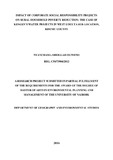| dc.description.abstract | Water is fundamental to health, survival and livelihood, hence the international concern that it attracts. Globally it is seen as an economic, social, cultural and environmental good, and to a large extent, not only a basic need but a human right. Research has shown that rural water programs benefit communities by improving children‟s education, health of communities and promoting their income generating activities. Owing to several factors, the problem of water access remains a multi-million challenge for families in rural areas. Households remain far from water projects despite interventions that governments, NGOs and other agencies inform of CSR have put in place.
This study set out to investigate the impacts of CSR water projects on poverty reduction in West Koguta Sub-location using KenGen‟s CSR water projects as a case study. Specifically, the study sought to identify effects of CSR water project on household food security, determine levels of household income before and after implementation of CSR water projects, and compare and contrast school attendance and enrollment rates before and after CSR projects. The indices in the three objectives are directly influenced by access to water in West Koguta Sub-location. On the basis of a case study design, the study collected data from a sample of 127 households who were selected from a population of 460 beneficiaries CSR water projects. Questionnaires were administered to 127 sample household heads; key informant interviews were administered to CSR program officials at KenGen, local national government administrative officials, and traditional leaders (tribal elders); three focus groups were carried out, one each for women, youth and men drawn from CSR project beneficiaries; while the researcher used field notes and digital camera to capture observation data. Data obtained were edited, entered and stored in an SPSS system and appropriate statistical procedures applied on the dataset.
The results showed that the KenGen‟s CSR water projects led to increased diversification of crops and livestock in the study area. Maize, beans, sorghum, cassava sweet potatoes and millet were the main rain fed food crops grown in the area before CSR water projects were implemented. Implementation of CSR water projects led to introduction of new crops such as tomatoes, water melon, sugarcane and other vegetables such as black nightshade, spider plant and pumpkin leaves which were grown using irrigated crop production. Availability of water inspired construction of fish ponds. Also, availability of water led to increased poultry production. The study findings showed that household income increased with a range of ksh. 2000-4000/= after CSR projects were implemented. School enrolment enrollment rates rose
vi
from an average of 7%to 7.8% which can be attributed to KenGen‟s CSR water projects in the area. A Chi-Square test led to the rejection of the hypothesis that “KenGen‟s CSR water project have no impact on the rural household poverty in West Koguta Sub-location” leading to the conclusion that the CSR water projects have had a significant impact on rural household poverty. The study concluded that KenGen‟s CSR water projects in West Koguta sub-location had significantly contributed to reduced poverty levels measured in terms of household income, household food security, school attendance and enrolment rates. The study recommends more similar studies on water for purposes of replicability of the findings. In particular, we need to understand how CSR projects influence poverty in different social-cultural settings. | en_US |



